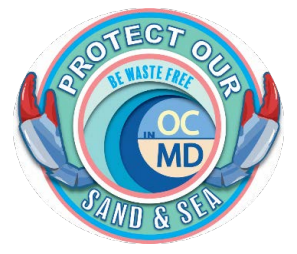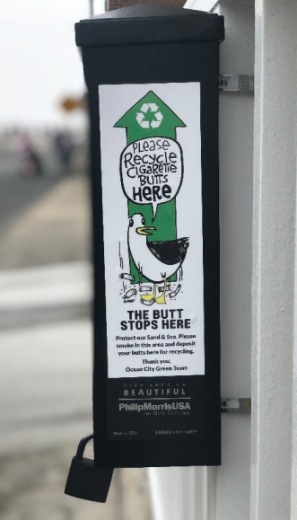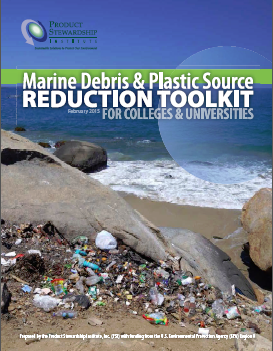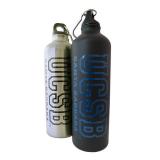Food Service-Related Source Reduction Programs
On this page:
- Maryland Coastal Bays "Protect Our Sand and Seas" Campaign
- Long Island Product Stewardship Institute Restaurant Guide
- ReThink Disposable Packaging Waste Source Reduction Restaurant Program
- Santa Monica Bay National Estuary Program's ReThink Disposable Pilot Project
- Reducing Food Service Plastics on University of California Campuses
Maryland Coastal Bays "Protect Our Sand and Seas" Campaign Protect Our Sand and Seas campaign logo.
Protect Our Sand and Seas campaign logo.
Project Champion: Maryland Coastal Bays Estuary Program
EPA Contribution: $ 20,000
Project Period: 2019-ongoing
EPA Point of Contact: Kelly Somers, U.S. EPA Region 3, somers.kelly@epa.gov
Project Description
In March 2019, Ocean City, MD launched a volunteer source reduction program to encourage businesses to making greener choices. The program was created by the Ocean City Green Team, which includes members from the Town of Ocean City, Maryland Coastal Bays Program (MCBP), Ocean City Surf Club, and the Ocean City Chapter of Surfrider Foundation. The Protect Our Sand and Sea campaign is an initiative to reduce the plastic waste stream in Ocean City. Businesses can choose to participate in any one of five source reduction pledges. Thanks to multiple sources of funding secured by MCBP and the Town of Ocean City, participants receive free social media promotion, newspaper advertisements, and marketing tools including recognition plaques and stickers.
A related source reduction program, “The Butt Stops Here,” also launched in Ocean City in 2019, is a responsible cigarette butt disposal and recycling program. Most cigarette butts are not biodegradable and can remain in the environment for over a decade. Thanks to a grant from Keep America Beautiful Cigarette Litter Prevention Program (CLPP) and the Worcester County Health Department Prevention Services, any business willing to take the pledge to commit to recycling cigarette butts can receive a free “butt hut” and signage.
Successes Recycling station for cigarette butts. Photo courtesy of Maryland Coastal Bays Program.
Recycling station for cigarette butts. Photo courtesy of Maryland Coastal Bays Program.
As of October 2019, thirty-three restaurants were signed up with the program. The Protect Our Sand and Sea pledge for businesses includes five tiers ranging from easier-to-adopt actions like phasing out plastic straws to more intensive actions such as eliminating all kinds of disposable plastic consumer products from business operations (cutlery, cups, plates, sauce packets, etc.). As of 2019, forty-eight of “The Butt Stops Here” cigarette disposal huts were placed in front of local restaurants. Cigarette butts taken from these huts are sent to TerraCycle to be recycled into park benches. As of October 2019, 259,650 cigarette butts have been shipped to TerraCycle and have been successfully kept out of Maryland Coastal Bays waterways. In addition, TerraCycle donates $1 to Keep America Beautiful for each pound of cigarette butts recycled. This is turn fosters the sustainability of further grant programs to fund additional source reduction initiatives in the future. Maryland Coastal Bays’ Protect Our Sand and Sea campaign and cigarette recycling program have received expansive local media coverage to help get the word out on the importance of these source reduction initiatives for protecting the local waterways.
Long Island Product Stewardship Institute Restaurant Guide
- Project Champion: Product Stewardship Institute
- EPA Contribution: $ 56,425 (EPA Region 2)
- Project Period: 2016-2018
- EPA Point of Contact: Josh Kogan, U.S. EPA Region 2, kogan.joshua@epa.gov
Project Description
Across the country, restaurants are becoming important partners in source reduction efforts. A recent survey by the National Restaurant Association finds that environmental sustainability is a top trend and chefs are paying close attention to sustainability, food waste reduction, and local sourcing. In Greenport, NY, four local eateries participated in the Product Stewardship Institute’s (PSI) plastics source reduction project. PSI is a national nonprofit that reduces the health, safety, and environmental impacts of consumer products with a strong focus on sustainable end-of-life management and was a critical partner in project implementation.
A significant amount of the global contributors to plastic pollution are single-use food service plastics like bottles and caps, straws and stirrers, carryout bags, and take-out containers. Partially funded by EPA Region 2, this project aimed to decrease the number of disposable plastic items that end up on Long Island’s beaches through partnering with waterfront businesses. Similar initiatives include the Surfrider Foundation’s Ocean Friendly Restaurants program and ReThink Disposable offer restaurants a set of criteria they can follow to reduce the amount of waste produced through daily operations – such as not using Styrofoam, plastic tableware, or plastic bags, and offering straws on request only; offering discounts for customers who bring in reusable cups and mugs; and using water and energy conservation appliances.
In 2018, PSI published “3 Steps to Reduce Plastic & Benefit Your Business: A Guide for Restaurants and Eateries,” which calls on food establishments to 1) Assess their company’s plastic footprint, 2) Create a reduction plan to reduce or eliminate disposables and educate customers about their transition, and 3) Update official company purchasing policies by adopting a disposable food-ware policy. The Long Island PSI Restaurant Guide serves as a technical assistance document that helps food business operators reduce waste and cut costs by minimizing disposable packaging items. The online Plastic Footprint Tool and a Foodware Cost Calculator can be used to help business owners estimate the costs of plastic items and project savings achievable with plastic reduction strategies. The four pilot restaurants offer tangible examples for other food service providers to emulate.
Successes
After adopting more sustainable products and operations through this initiative, one Central American restaurant, Tikal, now prevents an estimated 52,000 plastic items annually and has reduced the amount of plastic waste produced by business operations by over 2,000 lbs per year. In doing so, Tikal will also save $3,578 annually, plus an additional $90 in savings annually from reduced waste collection fees. These environmental and economic benefits came from simple management decision actions including: switching Styrofoam cups, cutlery, and containers to reusable alternatives, providing napkins and straws only after being asked, switching from plastic carryout bags to paper, and replacing disposable plastic table covers with handmade Guatemalan cloths. Read the Restaurant Guide EXIThere.
ReThink Disposable Packaging Waste Source Reduction Restaurant Program
- Project Champion: Clean Water Fund
- EPA Contribution: $257,293 Recipient Match: $85,764
- Funding Program: San Francisco Bay Water Quality Improvement Fund
- Project Period: 2012 – 2015
Project Description
Clean Water Fund created a pilot project called ReThink Disposable EXIT to work with local governments and food establishments to develop cost-effective models to reduce takeout food disposable packaging. In earlier years the organization conducted a litter survey in the Bay Area finding that 67% of trash in storm drains or catch basins were food and beverage take-out related. ReThink Disposable is a free technical assistance program that helps food businesses implement best practices to reduce use of disposable food serviceware resulting in reduced waste and cutting costs by minimizing disposable product usage. The project is working with local municipalities to target reductions in takeout food packaging in restaurants by performing outreach, enrolling restaurants in the program and developing practical source reduction methods tailored for each local businesses.
Successes
- Enrolled over 46 Bay Area restaurants and 9 food trucks in the program
- Quantitative analysis of Source Reduction of disposables at 30 restaurants
- Reduced over 2.8 million disposable foodware packaging items annually
- Reduced 14.8 tons of waste annually
- Saved Businesses an average of $3000 annually.
- Click here .(2 pp, 1.5 MB, About PDF) EXITto read a case study on The Sacred Wheel, a cafe in Oakland. By implementing ReThink Disposable's recommendations, The Sacred Wheel saved a total of $3,768 per year and eliminated 602 pounds of single-use disposable waste.
The ReThink Disposable program received the Governors Environmental and Economic Leadership Award in 2015 from the California EPA which recognizes individuals, organizations, and businesses that have demonstrated exceptional leadership and made notable contributions in conserving our precious resources, protecting and enhancing our environment, and building public-private partnerships.
Santa Monica Bay National Estuary Program's ReThink Disposable Pilot Project
- Project Champion: Santa Monica Bay National Estuary Program
- EPA Contribution: $ 25,000
- Project Period: 2018-2019
- EPA Point of Contact: Erica Yelensky, U.S. EPA Region 9, Yelensky.erica@epa.gov
Project Description
Across the country, restaurants are becoming important source reduction partners. The average restaurant uses 300,000 gallons of water per year and generates around 100,000 pounds of garbage per year! A recent survey by the National Restaurant Association found that environmental sustainability is a top trend and chefs are paying close attention to sustainability, food waste reduction, and local sourcing.
In 2018, with financial support from EPA’s Trash Free Waters Program, the Santa Monica Bay National Estuary Program (SMBNEP) implemented a one-year pilot project, ReThink Disposable, in partnership with Clean Water Action and Clean Water Fund at four Los Angeles restaurants. The goal of ReThink Disposable is to work with food service establishments to minimize use of single use disposable packaging to conserve resources, prevent waste, and reduce marine debris. Through this program, SMBNEP provided technical assistance to food business operators to reduce waste and cut costs by transitioning to reusable food and beverage ware.
Successes
Santa Monica Bay National Estuary Program staff completed pre-and post-implementation audits at the four ReThink Disposable participating restaurants to measure impact. These four restaurants eliminated 247,570 pieces of single-use disposables resulting in an annual waste reduction of 2,637 pounds. On average, restaurants were expected to have a 14-month payback period for investing in source reduction actions. In addition, annual total savings for the participating restaurants was $8,017. For video testimonials from participating restaurants, please visit: https://www.santamonicabay.org/explore/our-communities/rethink-disposable-l-a/. Looking forward, the Santa Monica Bay National Estuary Program is broadening the program to work with food service establishments at other facilities such as yacht clubs and boating facilities that have dining operations.
Reducing Food Service Plastics on University of California Campuses
- Project Champion: Product Stewardship Institute
- EPA Contribution: $ 164,245 Recipient match: $83,218
 Click here to view and download the Marine Debris & Plastic Source Reduction Toolkit for Colleges & Universities
Click here to view and download the Marine Debris & Plastic Source Reduction Toolkit for Colleges & Universities - Funding Program: West Coast Estuaries Initiative for the California Coast
- Project Period: 2012 - 2015
Project Description
The Product Stewardship Institute (PSI) designed and implemented a project to promote plastic source reduction on three University of California (UC) campuses: UC Santa Barbara (UCSB), UC San Francisco (UCSF), and UC San Diego (UCSD).
PSI worked with these campuses to identify and implement strategies consistent with each campuses unique waste management infrastructure to eliminate or reduce the use of disposable plastics in food service settings, including replacing single-use plastics with durable, reusable products or those that have minimal environmental impact. Project partners included: Plastic Pollution Coalition, California Product Stewardship Council, Clean Water Fund California, and the University of California Office of the President.
During the project, PSI developed the Marine Debris & Plastic Source Reduction Toolkit for Colleges & Universities which outlines repeatable process to approach source reduction in an institutional setting such as university campuses complete with case studies and lessons learned from each participating campus.
- The toolkit identifies four steps in reducing packaging on campus:
- Determining the campus’s plastic footprint to identify reduction opportunities;
- Creating a source reduction plan to reduce or eliminate the use of disposable plastic items;
- Changing campus procurement practices by identifying less environmentally impactful products;
- Establishing municipal and/or campus-wide source reduction policies.
Full case studies for each campus can be found in the toolkit link above.
Successes
University of California Santa Barbara (UCSB)
Top 5 disposable plastic items at UCSB were lids, cutlery, straws, water bottles, and bags. UCSB targeted bottle and bags reduction.
- Elimination of 60,124 single-use plastic water bottles and a 54 percent decline in single-use water bottle sales by UCSB improved signage for their hydration stations and reusable water bottles were given to incoming freshman
- Elimination of 34,550 of the 35,000 plastic bags used on campus per year. UCSB convinced the Subway store on their campus to cease the purchase of plastic bags, the franchisee's decision resulted in a 97 percent decline in plastic bag use on campus.
University of California San Francisco (UCSF)
Top 5 disposable plastic items: cutlery, lids, soda and juice bottles, straws, and water bottles. UCSF targeted reduction of water bottles and switch to compostable cutlery and lids as this was compatible with their waste management infrastructure.
- Elimination of 50% of the campus’s purchase of single-use bottled water by 50 percent, saving $27,500 each year by retrofitting over 60 of its on-campus water fountains with gooseneck spouts allowing users to more easily refill reusable water bottles
- Use of compostable cutlery is known as substitution rather than source reduction since it does not actually eliminate the single-use disposable items.
Limited research is available on how compostable plastics behave in the marine environment as they are designed to degrade in the high temperatures of industrial composting facilities. There is currently no definition for marine degradable plastics.


